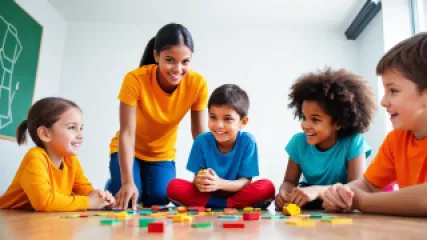Effective Child Resilience Training Techniques
Resilience is a critical skill that allows children to navigate the challenges and setbacks they encounter in life. It empowers them to adapt, bounce back, and thrive in the face of adversity. As parents and caregivers, it is our responsibility to equip children with the tools they need to develop resilience. In this tutorial, we will explore effective child resilience training techniques that can help boost your child's ability to overcome obstacles and build a strong foundation for their future.
Understanding Resilience
Before diving into the techniques, let's first understand what resilience means in the context of child development. Resilience is the capacity to recover quickly from difficulties or setbacks. It involves the ability to adapt, problem-solve, and maintain a positive outlook despite challenging circumstances.
Resilience is not something that children are born with; it is a skill that can be nurtured and developed over time. By providing children with the right support and guidance, we can help them cultivate resilience and thrive in various aspects of their lives.
The Importance of Resilience in Children
"The greatest glory in living lies not in never falling, but in rising every time we fall." - Nelson Mandela
Resilience plays a crucial role in a child's overall well-being and success. Here are some key reasons why building resilience in children is essential:
- Emotional Well-being: Resilient children have a higher level of emotional well-being. They are better equipped to manage stress, regulate their emotions, and handle conflicts effectively.
- Mental Health: Resilience acts as a protective factor against mental health issues such as anxiety and depression. Children with higher levels of resilience are more likely to have positive mental health outcomes.
- Academic Performance: Resilient children are better able to cope with academic challenges and setbacks. They have a growth mindset that allows them to embrace learning opportunities and persist in the face of difficulties.
- Problem-Solving Skills: Resilience fosters problem-solving skills in children. They develop the ability to identify solutions, think critically, and make informed decisions.
- Social Relationships: Resilient children tend to have healthier and more positive relationships with peers and adults. They have effective communication skills, empathy, and the ability to navigate conflicts constructively.
Effective Child Resilience Training Techniques
Now that we understand the importance of building resilience in children, let's explore some effective training techniques that can help enhance their resilience:
1. Encourage Healthy Risk-Taking
Encouraging children to step out of their comfort zones and take healthy risks is an excellent way to foster resilience. Allow them to engage in age-appropriate activities that challenge their abilities and provide opportunities for growth. Whether it's trying a new sport, participating in a school play, or joining a club, these experiences help children develop confidence, learn from failures, and build resilience.
2. Foster a Growth Mindset
A growth mindset is the belief that abilities and intelligence can be developed through effort and practice. Teach children that failures and setbacks are opportunities for growth rather than indicators of their abilities. Encourage them to embrace challenges, learn from mistakes, and persist in the face of difficulties. This mindset shift empowers children to view obstacles as stepping stones to success and builds their resilience.
3. Teach Problem-Solving Skills
Resilient children are effective problem solvers. Teach your child problem-solving techniques such as breaking down problems into smaller steps, brainstorming multiple solutions, evaluating the pros and cons, and implementing the best solution. By equipping children with these skills, you are empowering them to tackle challenges independently and develop resilience.
4. Promote Emotional Regulation
Emotional regulation is the ability to manage and express emotions in a healthy and appropriate manner. Help children identify and label their emotions, teach them coping strategies such as deep breathing or mindfulness exercises, and encourage open communication about feelings. By promoting emotional regulation, you are providing children with the tools to navigate difficult emotions and build resilience.
5. Nurture Supportive Relationships
Strong and supportive relationships act as protective factors in building resilience. Foster connections between your child and supportive adults such as family members, teachers, mentors, and friends. Encourage open communication, active listening, empathy, and provide a safe space for your child to express themselves. These relationships serve as a source of comfort, guidance, and encouragement, enhancing your child's resilience.
6. Cultivate Optimism and Gratitude
Optimism and gratitude are powerful resilience-building traits. Encourage your child to focus on the positive aspects of their lives and practice gratitude regularly. Teach them to reframe negative situations by finding opportunities for growth and learning. By cultivating optimism and gratitude, you are helping your child develop a positive outlook and resilience in the face of challenges.
7. Promote Self-Care and Well-being
A key aspect of resilience is taking care of oneself. Teach your child the importance of self-care, including getting enough sleep, eating nutritious food, engaging in physical activity, and practicing relaxation techniques. By prioritizing their well-being, children learn to recharge, cope with stress, and build resilience.
Conclusion
Building resilience in children is a lifelong journey that requires consistent support, guidance, and nurturing. By implementing these effective child resilience training techniques, you can equip your child with the skills they need to navigate life's challenges successfully. Remember, resilience is not about avoiding adversity but rather about developing the strength to overcome it. Empower your child to embrace setbacks, learn from failures, and grow into resilient individuals who can thrive in any situation.






